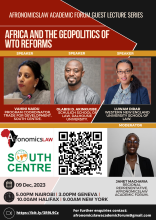Call for Papers: AfIELN 8th Biennial Conference: Africa and the Future of International Economic Law: Navigating Geopolitical Realignments, Sustainability Imperatives, and Technological Disruptions (EN/FR) (UM6P, Rabat, Morocco)
The African International Economic Law Network (AfIELN) invites the submission of abstracts for its 8th Biennial Conference taking place at the University Mohammed VI Polytechnic, Rabat, Morocco, from 20 to 22 June 2026.
